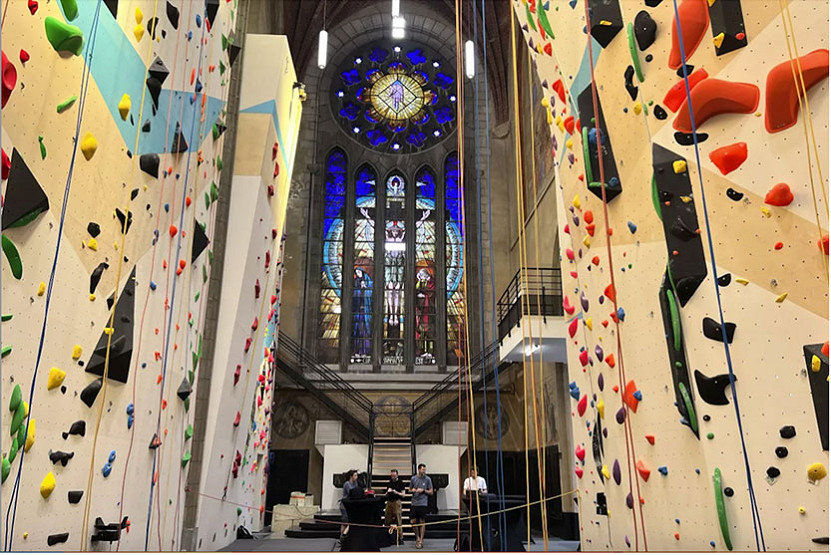Community cohesion
Will the continued demise of church congregations make any difference to the general wellbeing and cohesion of our community?
I’m reflecting on this question following on from the August Kensington Association column when I wrote that “the most recent census confirms there is steady wilting of all branches of mainstream commitment to organised religion”. I then reflected on the fate of church buildings and church sponsored social services.
By the way, look at this “repurposing” of a church in Belgium (pictured)! Climbing the rocky road to heaven.
There was a day when Sunday morning – for religiously minded people – was a busy time; morning church (or Mass) and Sunday school for the kids, often dressed in their “Sunday best”. Then during the week there might have been other “meetings” … youth groups, Bible studies, choir practice or even sporting groups – teams representing the church. I’m sure some of that church-based busyness persists, but much diminished.
Now it is left to church-affiliated schools to fly the flag for the faithful. They are quite successful for two main reasons:
Parents believe (rightly or wrongly) that church schools provide something extra in terms of discipline or ‘values based’ education; or:
Because of some sense of “tradition”. Parents might be atheist (or agnostic) and never attend church, but they might have attended a church school themselves. So, sending their children to a church school feels somehow “safer” … anyway it might please Grandma and Grandpa.
Community cohesion equates with the level of connection between people within the community, consequently if one avenue for connection disappears, cohesion must necessarily diminish – unless something evolves to replace it.
A careful analysis of this can become quite complex and philosophical … perhaps too heavy and out of place in this North West City News column, so let’s keep it simple with a few questions.
Where do adults come together to share? The pub?
What does your family do on Sunday mornings? Sleep in? Watch TV? Play sport?
When you “share” with adult friends, what do you share? Footy talk? Family issues? Work problems? Politics?
Is the fate of your footy team a kind or “religion” for you? How much time do we (adults and young people) spend on our “devices”? Do you belong to any “clubs”? Are you active in any “organisations” outside your work?
In asking these questions, in essence I’m asking (in our post-religious-practise-lives), where, when and why do we connect with one another; or perhaps more simply, what is important, what gives us meaning in our lives?
A few years ago, I attended something called “The Weekly Service”. This was a group of mainly Gen Ys who were disillusioned with mainstream religion but wanted to meet, mingle, and share. Storytelling was a big part of it, also discussion (prompted by the stories), together with some music, and shared food. I thought it was great, but it didn’t last – maybe volunteer fatigue?
All this broadens the scope of my original question but doesn’t answer it. What is lost (if anything) in our post-religious lives? Are our communities becoming less cohesive, and if so, is there something we can do to stem the loss? Reader feedback is welcome … •

Affordable housing proposed on council land







 Download the Latest Edition
Download the Latest Edition